First Time: Framus – Guitars, Amps in NYC
I live in Jersey (that’s New Jersey for those of you in Europe) and don’t have to leave “The Garden State” to have new tonalicious experiences. But it’s also true that you can only have some experiences in “New Yawk Citae,” so I get in there from time to time.
My most recent trip was for the explicit purpose of checking out Framus – an experience that right now you for sure can’t get many places outside of Europe. Founded in 1946 in Germany, Framus/Warwick is the Gibson or Fender of Europe. But in this country the company has only really been known for its Warwick basses and ultra-high-gain Framus amps.
The company is out to change that, and has established a beach head in NYC. The store – at 76-80 East 7th St. – is a combo US HQ, retail outlet and artist relations department. The space isn’t huge, but it has everything it needs and looks cool. And though you may assume otherwise given the Framus ads in the major guitar mags, as of this writing the company has less than a dozen dealers in the U.S. – so the NYC HQ is it’s one of the few places you can go to actually play a Framus.
(The NYC store is called the “New York Custom Shop” but that’s just in reference to the fact that all Framus guitars and Warwick basses are handmade and thus custom. They’re made in Germany. Tyler Krupsky, sales manager for Framus USA, says: “The instruments that we do showcase here are things that we have deemed worthy of being a special piece, even if they have mostly stock features. They’re completely custom and one-off.”)
The ads looked cool, the gear looked cool, I’d never played anything Framus, so I went to check it out. Glad I did. My impressions:
Guitars
I found the guitars Music Man-like in neck feel, practical neck joint, overall build quality (Framus axes were definitely nicer in some cases) and the fact that the guitars have attractively different shapes reminiscent of classic electrics (a good thing). That, by the way, is a huge compliment because Ernie Ball/Music Man guitars are top-notch.
That said, the Framus guitars are different, so you’ll have to decide whether their high-quality German construction, unique looks and limited availability – so you won’t look like every other guy when playing out – justify prices that START in the high $2Ks.
Make no mistake: These are high-quality guitars and they’re treated that way by the company: They get a full setup before leaving Germany and again before leaving Framus USA, and several models come with a sweet “RockCase” flight case.
I played every model they had, and all were different from one another which was cool. Another interesting thing is that some of the designs were first used by the company back in the ’70s – so Framus has a good eye for classic design – great and somewhat rare when it comes to non-Fender and -Gibson guitars.
Bearing in mind that I’m a rock guy, not an ES-335 or jazz/fusion/whatever guy, my favorite Framus axes were ones that had rock proportions and produced rock tones. My favorites were the super-sweet Hollywood Custom and the Renegade Custom II, with the Panthera third on the list.
Hollywood Custom
I love this guitar. P-90-equipped, it sounds big (chunky big, not boomy big) and clear. It has a mahogany hollow body, a flame maple top, F-holes, a two-bolt comfortable mahog neck and ebony fingerboard with Framus’ cool “Tradition Framus” mother-of-pearl inlays. The P-90s are Duncans (SP90s). All those features indicate Gibson-like, but the scale is 25.5″ – and I never noticed when playing it. I was just carried away, mang!
This guitar just has it going on. Easy to play, no bad sounds anywhere, sounds GREAT. Some of that is the sonic properties of the P-90s, but at least an equal amount is the guitar.
Mahog, maple top, ebony board = sweet. I’m not usually a hollow-body guy – they seem a little delicate and make me feel older than I am – but dang! A huge added bonus is that the guitar just looks so cool. The shape is cool, unique yet classic, and it’s one of those guitars that no matter what color it is, it looks great.
MSRP is…take an aspirin…$6,992!
It’s the big one, Elizabeth! (Red Fox reference.)
Expensive, yeah, but…for me, the Hollywood Custom is a “one day I will own it” guitar.
Renegade Custom II
The Renegade Custom II is a Tele take-off. Absolutely. Tele-ish shape, ash body (swamp ash), Tele bridge, bolt-on neck – what else would you think of. The reasons I wanted to play it – even though it’s a discontinued model – were that I like ash guitars, and it has a Firebird-looking Duncan mini-hum (model SM1) in the neck position.
What I found was, once again, great playability, great feel and great tone in all three positions (the bridge pickup is stacked, so no hum). I wanted it, but in the high-$2Ks ($2,872) it was too pricey to be an impulse buy. In other words, at that price I didn’t really “need” it.
Do you need a high-quality German guitar that’s pushing $3K – or more? Maybe you do, just like you need an expensive car: Replace “guitar” with “car” and “$3K” with “$60K” and your answer would be….
Panthera
This is a no-frills Les Paul-ish guitar. Mahog body and neck (no neck heel!), rosewood board, 24.75″ scale, Duncan JB/Jazz pickups – which, unlike LPs, can be coil-split for single-coil-ish sounds – and a TonePros bridge.
I liked this guitar for the same reason anyone would like any well-done guitar with those specs: tone. It sounded classic-rock good. And it’s always nice to play a plain-wood, fast-playing version of a Les Paul – sort of a modern and better Les Paul Studio.
You can even get the Panthera with a Bigsby tailpiece – the Panthera Legacy. The Panthera Legacy has pretty much the same specs aside from the Bigsby, except it has a Duncan Pearly Gates in the bridge and an Alnico Pro II in the neck, a combo I prefer over the JB/Jazz.
MSRP for this one is in the same multiple-K ballpark.
Upshot
Because of the German manufacture, attention to detail and the high price, some will say these are the BMWs of guitars. I guess that’s fair. I’d say they’re really nice-looking, really well-constructed, good- and great-sounding guitars.
I’ll add here that just because I didn’t mention the other guitars, doesn’t mean I didn’t like them or they weren’t superb pieces of musical machinery. Just again, they didn’t speak to my rock bones.
Amps
Unbeknownst to me, and maybe to some of you, Framus is known for high-gain amps. GAIN, baby! Seems Germans love them some gain, and apparently the drop-C/chugga-chugga/Cookie-Monster-vocals crowd loves Framus Cobra and Dragon amps because they do that thing well.
I found that a little odd. There I was in this hip store surrounded by high-priced non-shred-specific axes, and all the amps (admittedly not many) except one were gainiacs. Also odd is that the clean channels on these amps are ultra-clean. So you have a moist towelette on one channel and a lumberjack’s doormat on the other.
I’ll say three things about the Cobra:
> I was curious, so I turned the gain all the way up and…well, there was a guitar in there somewhere! But dialed back, it sounded pretty good, depending on the guitar…
> …The Hollywood Custom even sounded great through this amp.
> The amp is so metal, even the speaker cabs have a metal grille – which has to do something to the sound (make it more metal?).
Luckily the Ruby Riot II saved the day. A 4xEL84 amp (4xEL84s again!), it sounded meaty but not Marshally. With four EL84s everyone thinks Vox AC30 and I guess that was there, but the Ruby Riot II had its own thing going on. It was a 2×12 combo (one V30 and one Greenback, both 16 ohms), and sounded big. Not 4×12 big, but big. Different big.
I have to confess that I didn’t spend too much time on the clean channel. I never play clean and prefer amp distortion over pedals any day – not saying it’s better, just what I like. The dirt channel had beef, but it had to be mated with the right guitars.
I also didn’t play as loud as I would’ve liked – didn’t want to torture folks – but even at that low volume, plug in the Hollywood Custom and you could be gone all day.
Bottom line is that a good (not handwired) 4xEL84 combo with one V30 and one Greenback has all kinds of tonal possibilities. I wish I had more time to mess with them all, and I wish I had brought my favorite Les Paul with me to hear it through that amp.
One more thing: Even though the construction and look of the amp is vintage-cool, just in case you need it the amp has a bunch of gain on tap….
Nice amp, but the MSRP is $4,836, which would make it just about the most expensive amp I’ve ever heard of – certainly the most expensive one I’ve ever played through. Worth it? That’s up to your own ears, but my feeling is that for $2K you can get almost any of the best amps ever made, whether current or vintage. Go to one of the amp shows to find out what I mean.
Tyler mentioned that Framus is looking at either reviving or creating a new, lower-watt amp, presumably a combo. No details yet.
Bottom Line
By the quality and high prices, you can tell Framus’ business model doesn’t depend on selling a Strat or Les Paul to everyone in America. Thank goodness – we don’t need any more of that. Instead the company is operating more like a boutique manufacturer, just one with deep pockets.
If you get a chance, check out the Framus stuff. Well worth a trip.
Notable
> Some Framus guitars have necks made out of ovangkol, which typically is used on basses. From what I could gather, tonally it’s like a mahogany or korina with a little bit of snappy, maple-ish edge to it. Felt great on the hands.
Tyler said Framus/Warwick has been using the wood for 10 years. “It has more of a midrange bite to it [and] for guitar it’s a great compliment to many wood types as it offers a great upfront punch to the sound. It’s one of those woods that is readily available, very stable and hard, easy to work with and sounds good. Pretty much a no-brainer.
“Everyone has their personal preferences, but 90% of the people I have in here trying guitars out for the first time usually comment on how they love the feel of the natural wood [necks] on some of our models.”
> Tyler and Freddy (who heads artists relations) are cool guys who know their stuff, including the history of the company and a great familiarity with the NYC music scene. Think about that for a second. In this era of big-box stores, that kind of depth of knowledge is a rarity. I really enjoyed it.
> I’m not stumping for Framus here, but any guitar retailer reading this might want to check into becoming a Framus dealer. Compared to big U.S. manufacturers, the buy-in is doable and rational.
> Check www.framus.de for dealers in your area.
Category: Framus
Comments (2)
Trackback URL | Comments RSS Feed
Sites That Link to this Post
- WoodyTone! - Ludlow Guitars in NYC: Store and Guitars Review | March 24, 2010

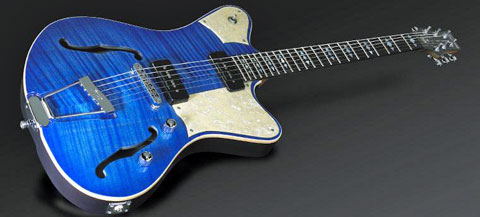
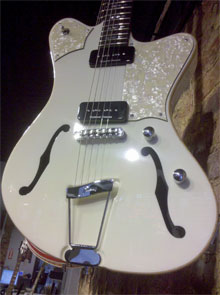
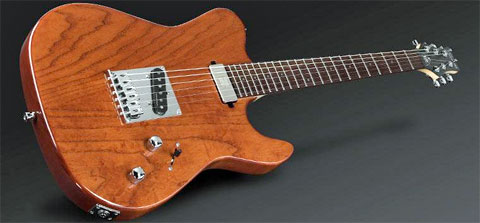
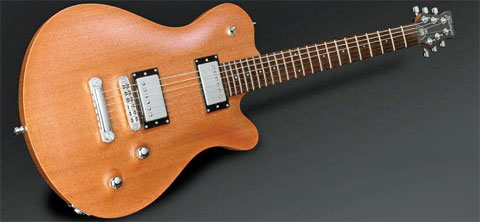
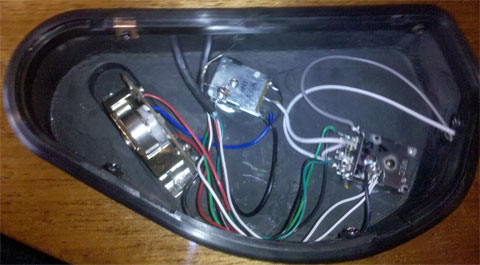
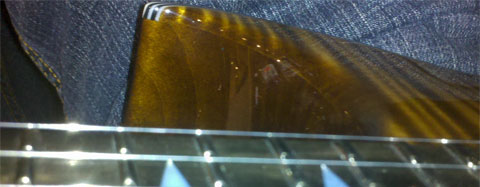
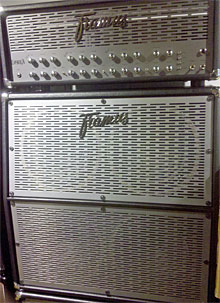
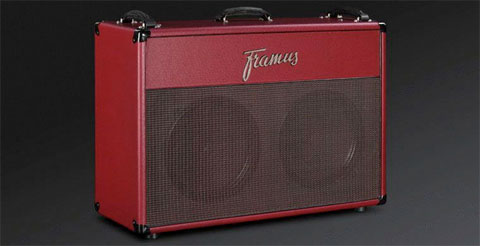
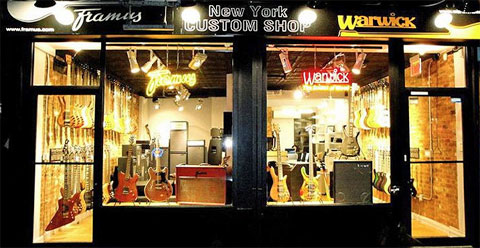






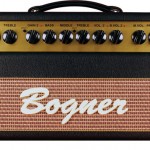

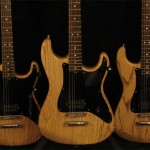


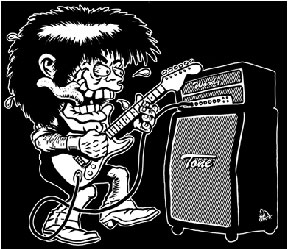

I bought a Framus Renegade Pro this week (swamp ash, oiled burgundy finish and that dark, smooth neck), one of the last one's available (not a Custom shop version, the regular retail version). I was originally searching for an SG or LP Studio 60's (looking for a thinner neck) but the Gibson quality issues drove me to look elsewhere.
The build quality is light years ahead of Gibson (I have a Les Paul as well), you really have to pick one up to believe it. The sound is excellent, both clean and dirty. Feel of the guitar is again well beyond the SGs, Les Pauls and Strats that I have played. I simply don't want to put the Framus down, ever… It's simply screaming "PLAY ME!"
Is it expensive? Yes. But so is a decent mid-level Les Paul or SG. But with the Framus I'm not under the impression I'm buying a lot of empty marketing hype.
If you're into a superior quality guitar that not everyone has, and is actually worth the investment of your hard earned cash, take a look at a Framus.